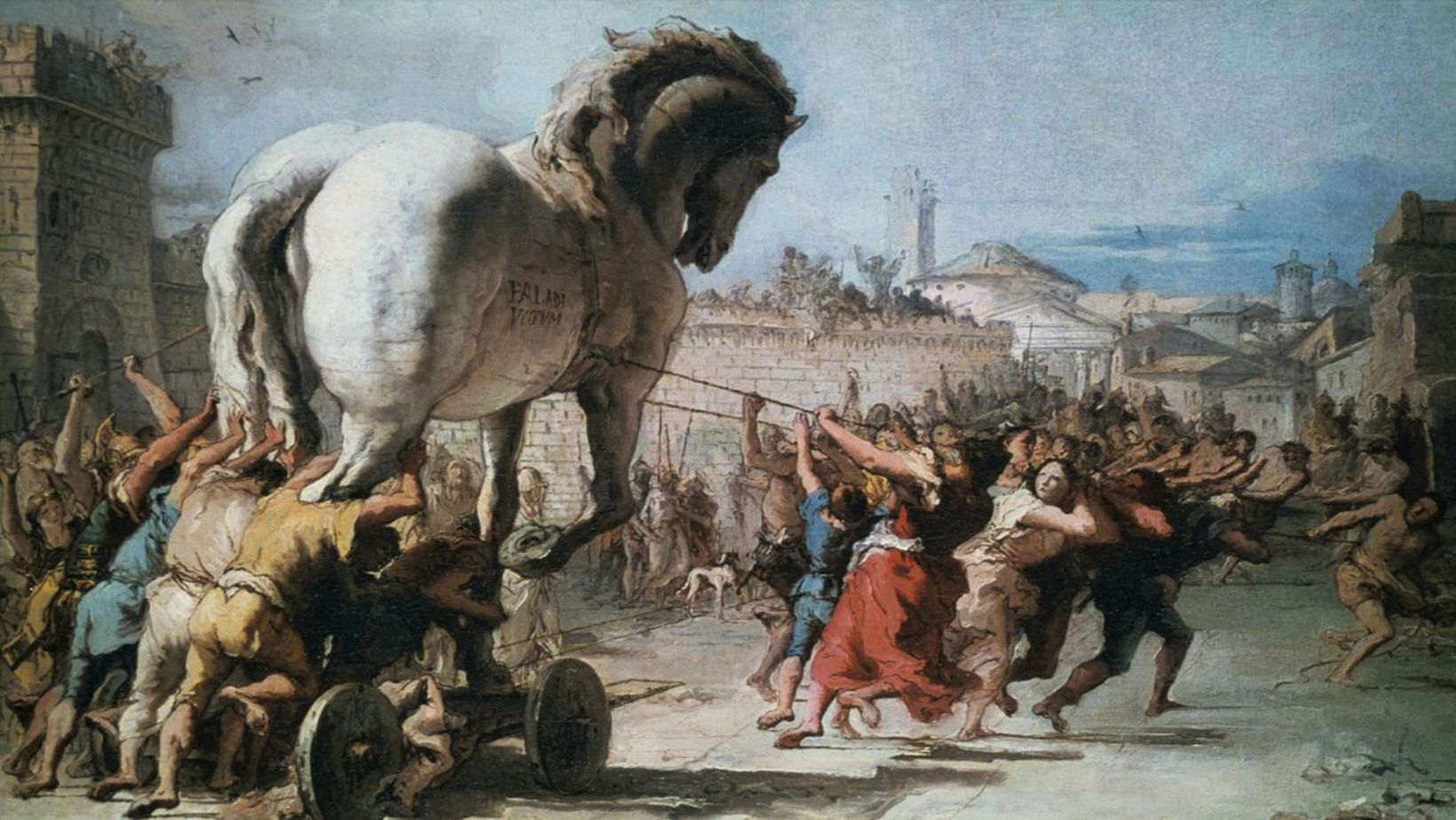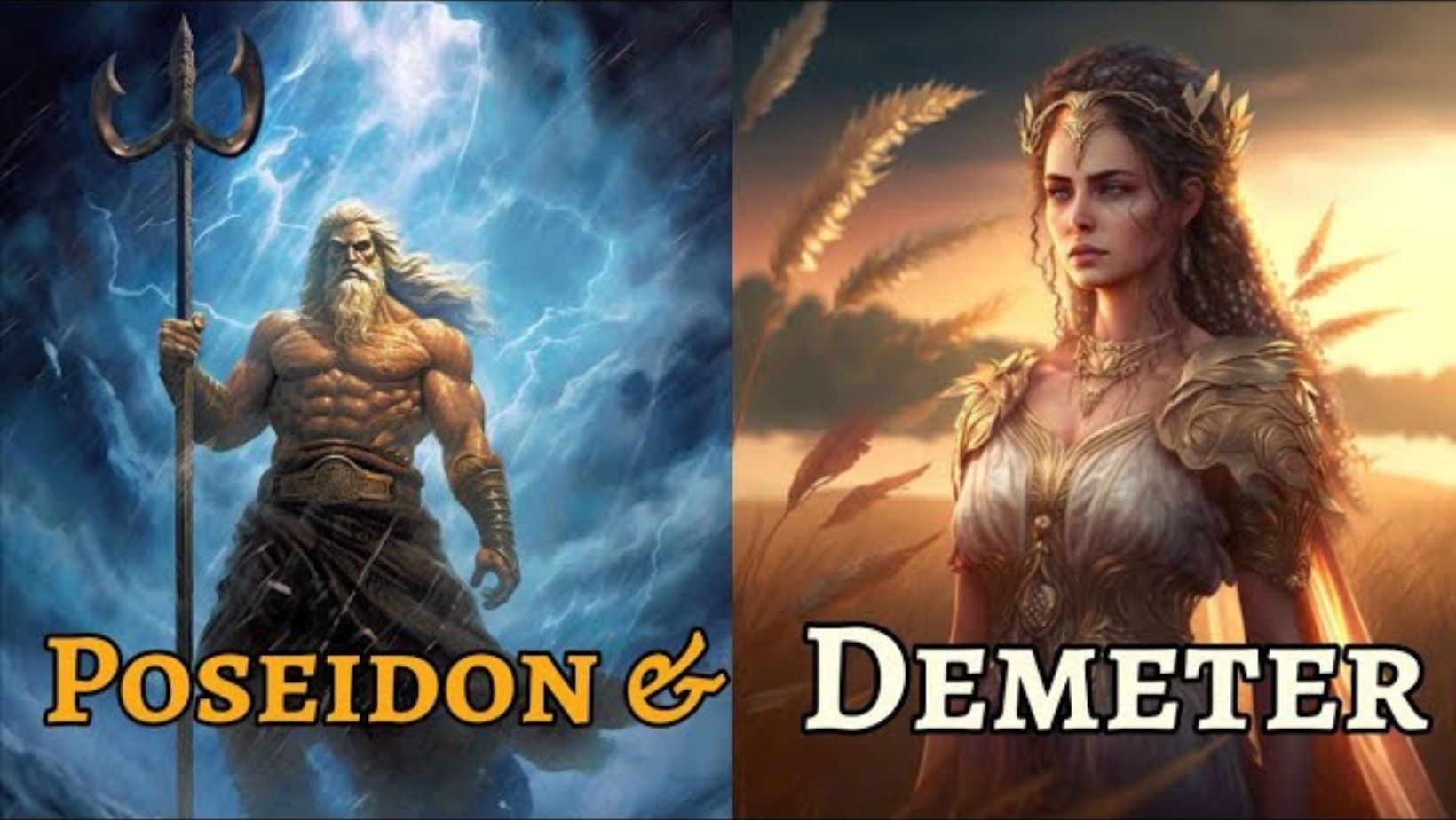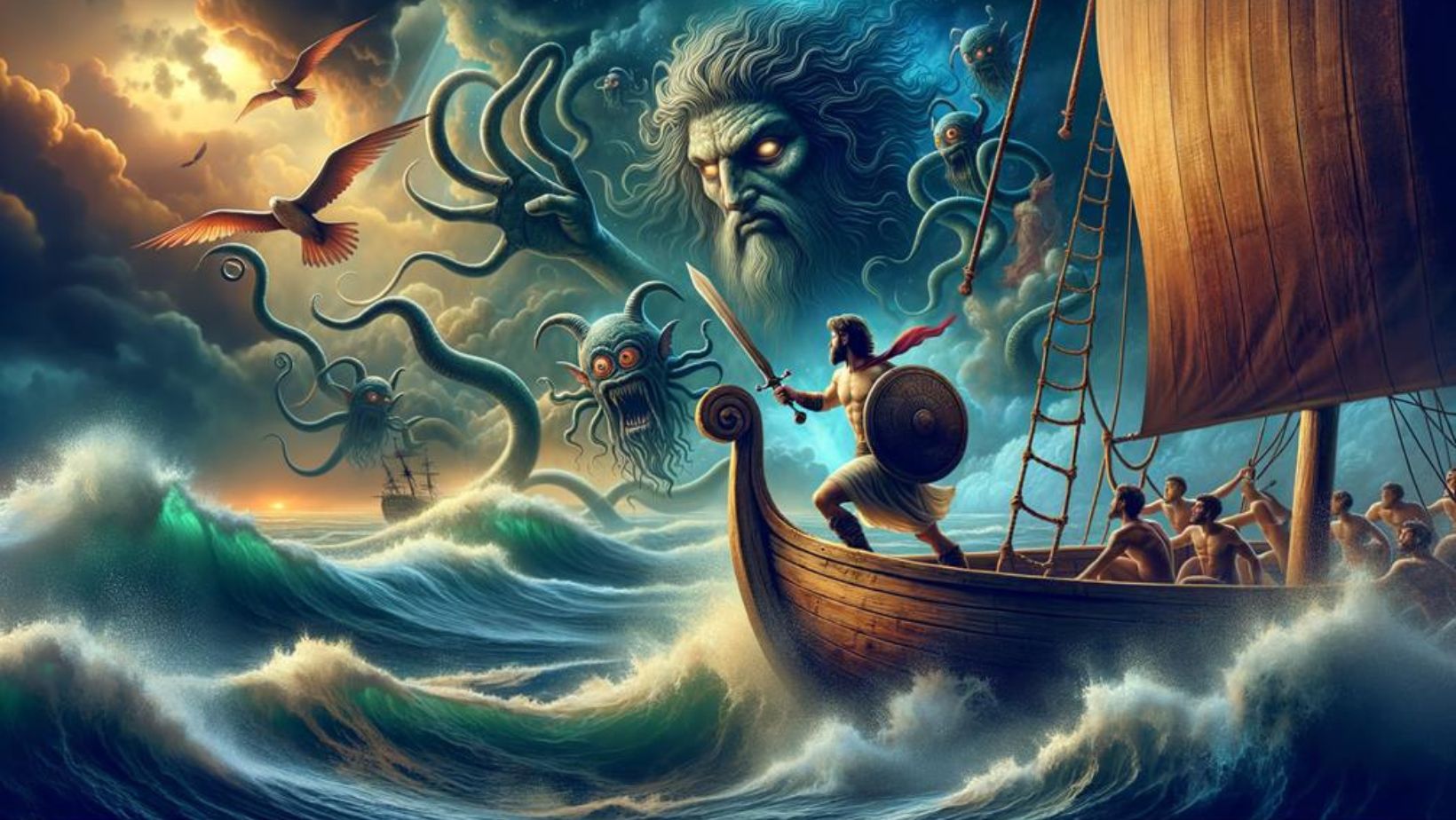Ever wonder about the gods’ behind-the-scenes drama during the Poseidon and the Trojan War? Poseidon, the moody and powerful god of the sea, was right in the thick of it. This dude had some serious beef with the Trojans, and he wasn’t afraid to use his aquatic powers to stir things up.
But why did Poseidon have it out for Troy in the first place? And how did his godly grudges and alliances shape the course of the war? Grab a trident and let’s dive into the stormy waters of Poseidon’s role in this epic conflict!
Table of Contents:
- Poseidon’s Role in the Trojan War
- The Wooden Horse and Poseidon’s Wrath
- Poseidon’s Pursuit of Demeter and Its Impact on the War
- Poseidon’s Rivalry with Athena and Its Consequences
- Poseidon’s Offspring and Their Roles in the Trojan War
- Poseidon’s Torment of Odysseus After the War
- Conclusion
Poseidon’s Role in the Trojan War: Poseidon and the Trojan War

When it comes to the Trojan War, one of the most epic conflicts in Greek mythology, Poseidon played a crucial role.
As the mighty god of the sea, Poseidon’s allegiance to the Greeks was a game-changer.
But why did this powerful deity choose to side with the Greeks?
Poseidon’s Allegiance to the Greeks: Poseidon and the Trojan War
Poseidon’s support for the Greeks stemmed from a long-standing grudge against the Trojans, particularly King Laomedon.
You see, Poseidon and Apollo had been tasked with building the walls of Troy for Laomedon.
But when the job was done, the king refused to pay up.
This betrayal left a bitter taste in Poseidon’s mouth, and he never forgot it.
So, when the opportunity arose to stick it to the Trojans during the war, Poseidon was all in.
Poseidon’s Feud with King Laomedon
Now, let’s dive a little deeper into Poseidon’s beef with King Laomedon.
According to the myth, Poseidon and Apollo were sentenced to serve Laomedon for a year as punishment for rebelling against Zeus.
They worked hard, building the impenetrable walls that would protect Troy.
But when it came time to collect their wages, Laomedon pulled a fast one.
He refused to cough up the cash and even threatened to sell the gods as slaves.
Can you imagine the audacity?
Poseidon was furious, and rightly so.
This act of disrespect and betrayal would fuel his support for the Greeks in the Trojan War years later.
Poseidon’s Influence on the Battlefield
So, how exactly did Poseidon aid the Greeks during the Trojan War?
As the god of the sea, he had some serious tricks up his sleeve.
Poseidon used his powers to create favorable conditions for the Greek ships, allowing them to sail swiftly and safely to Troy.
But he didn’t stop there.
On the battlefield, Poseidon’s influence was felt through massive earthquakes that shook the very foundations of Troy.
These earthquakes were so powerful that they demoralized the Trojan warriors, giving the Greeks a psychological advantage.
In one particularly memorable instance, Poseidon disguised himself as a Greek warrior named Calchas to inspire the troops and boost their morale.
Talk about a hands-on approach.
“Poseidon, the mighty god of the sea, played a vital role in the Trojan War by supporting the Greeks and using his divine powers to influence the tides of battle.”
The Wooden Horse and Poseidon’s Wrath: Poseidon and the Trojan War
The Trojan Horse is one of the most iconic symbols of the Trojan War.
But did you know that Poseidon may have had a hand in its creation?
Let’s explore the sea god’s involvement in this legendary stratagem.
Poseidon’s Hand in Creating the Trojan Horse
While Odysseus is often credited with the idea of the Trojan Horse, some accounts suggest Poseidon played a role in its construction.
As a master craftsman and the god of horses, Poseidon would have been the perfect candidate to oversee the building of this massive wooden structure.
Think about it: who better to create a giant, hollow horse than the god associated with these majestic creatures?
Poseidon’s involvement in the Trojan Horse showcases his commitment to the Greek cause and his willingness to use his skills to help them achieve victory.
The Significance of the Wooden Horse: Poseidon and the Trojan War
The Trojan Horse was not just a simple wooden structure; it was a game-changer in the war.
By concealing a group of Greek warriors inside the horse, the Greeks were able to infiltrate the city of Troy and launch a surprise attack.
This clever plan allowed them to bypass the impenetrable walls that Poseidon himself had helped build.
The horse literally changed the course of the war, leading to the fall of Troy and the triumph of the Greeks.
“The Trojan Horse, possibly crafted with Poseidon’s guidance, was a turning point in the war that allowed the Greeks to finally penetrate the defenses of Troy and claim victory.”
Poseidon’s Vengeance on Troy
For Poseidon, the fall of Troy was not just a military victory; it was personal.
The sea god had been nursing a grudge against the Trojans for years, ever since King Laomedon had wronged him.
So, when the city finally fell, it was the ultimate revenge.
Poseidon’s wrath against Troy was so great that he played a significant role in the city’s destruction.
Some accounts even suggest that he sent a giant sea monster to terrorize the Trojans after their defeat.
Talk about holding a grudge.
“The fall of Troy was the culmination of Poseidon’s long-standing feud with the city and its rulers, a vengeful act that showcased the god’s formidable power and wrath.”
Key Takeaway: Poseidon and the Trojan War
Poseidon’s grudge against Troy led him to side with the Greeks, using his powers to aid their victory. His involvement ranged from influencing sea conditions and causing earthquakes to helping create the Trojan Horse possibly. This all stemmed from a betrayal by King Laomedon, making Poseidon’s actions deeply personal.
Poseidon’s Pursuit of Demeter and Its Impact on the War: Poseidon and the Trojan War
The myth of Poseidon and Demeter is a fascinating tale that illuminates the complex relationships between the gods and how their personal lives could impact the mortal world, even during the Trojan War.
According to the myth, Poseidon was infatuated with Demeter and pursued her relentlessly. Demeter, however, was not interested in Poseidon’s advances and sought to escape his unwanted attention.
The Myth of Poseidon and Demeter

In one version of the story, Demeter transforms herself into a mare to hide from Poseidon. But the cunning sea god saw through her disguise and took the form of a stallion, eventually catching up to her and having his way.
From this unusual union, the divine horse Arion was born. This myth not only highlights Poseidon’s determination to pursue Demeter but also showcases his connection to horses, a domain he was often associated with.
How Their Relationship Affected the War: Poseidon and the Trojan War
While the relationship between Poseidon and Demeter may seem unrelated to the Trojan War at first glance, their interactions indirectly affected the conflict.
As the goddess of agriculture, Demeter’s focus on evading Poseidon’s advances could have led to neglect of her duties. This, in turn, might have caused crop failures and food shortages.
Such hardships would have affected the Greek and Trojan armies, adding to their challenges during the prolonged war. When armies relied on a steady supply of food, any disruption could have had significant consequences on the battlefield.
Moreover, the myth of Poseidon and Demeter highlights the gods’ capricious nature and how their personal desires and conflicts could spill over into the mortal realm. The gods’ involvement in the Trojan War was not limited to taking sides; their own relationships and rivalries often had far-reaching effects on the course of the conflict.
Poseidon’s Rivalry with Athena and Its Consequences: Poseidon and the Trojan War
Poseidon’s rivalry with Athena, the goddess of wisdom and war, was another defining aspect of his character that had significant implications for the Trojan War and beyond.
The most famous manifestation of this rivalry was the contest for the patronage of Athens, a city that would play a crucial role in Greek history and culture.
The Contest for Athens
The legend goes that both Poseidon and Athena desired to be Athens’s patron deity. To settle the matter, they agreed to present gifts to the city, and the Athenians would choose the one they preferred.
Poseidon struck the ground with his trident, creating a saltwater spring. Athena, in turn, planted an olive tree. The people of Athens ultimately chose Athena’s gift, as they found the olive tree more useful than the saltwater spring.
This decision sparked a bitter rivalry between the two gods that would have far-reaching consequences, not only for Athens but also for the Trojan War.
The Symbolism of Poseidon’s Gift: Poseidon and the Trojan War
Poseidon’s gift of a saltwater spring to Athens symbolizes his power over the sea and his ability to provide water, a vital resource. However, the Athenians recognized that saltwater was unsuitable for drinking or irrigation, making Poseidon’s gift less practical than Athena’s olive tree.
This rejection of Poseidon’s offering may have further fueled his resentment and desire to prove his superiority through his involvement in the Trojan War. As a god known for his temper and vengeful nature, Poseidon did not take slights lightly.
How the Rivalry Shaped the War
The rivalry between Poseidon and Athena likely influenced their actions during the Trojan War. While Poseidon sided with the Greeks, Athena’s allegiance was more complex. She initially supported the Trojans but later shifted her favor to the Greeks.
This divine conflict added another layer to the already complex web of alliances and animosities that shaped the war. The gods’ personal rivalries and agendas often influenced the course of the conflict, with mortals caught in the middle.
Moreover, the contest for Athens and the subsequent rivalry between Poseidon and Athena set the stage for the city’s future prominence. Athens would become a major player in the Greek world, known for its cultural, intellectual, and military achievements. The gods’ rivalry, in a sense, helped shape the destiny of one of the most influential cities in ancient history.
Key Takeaway: Poseidon and the Trojan War
Poseidon’s relentless pursuit of Demeter and their mythological union indirectly affected the Trojan War by causing food shortages. His rivalry with Athena also influenced divine alliances, shaping the conflict’s course.
Poseidon’s Offspring and Their Roles in the Trojan War: Poseidon and the Trojan War
Poseidon, the mighty god of the sea, fathered many children who played significant roles in the Trojan War. His offspring, divine and mortal, fought on both sides of the conflict, their allegiances and actions shaping the war’s course.
Notable Children of Poseidon
One of Poseidon’s most famous sons was the Cyclops Polyphemus, who encountered Odysseus during the hero’s journey home after the war. Another notable son of Poseidon was the giant Orion, a skilled hunter and warrior who was said to have fought alongside the Greeks in the Trojan War.
Poseidon’s sons were known for their strength, bravery, and, sometimes, their monstrous appearance. Polyphemus, for example, was a one-eyed giant who lived in a cave and terrorized Odysseus and his crew. Despite his fearsome reputation, Polyphemus was ultimately outwitted by Odysseus, leading to a grudge that would have far-reaching consequences.
Their Allegiances and Actions During the War: Poseidon and the Trojan War
The allegiances of Poseidon’s children during the Trojan War varied, with some fighting for the Greeks and others supporting the Trojans. For example, the sea god’s son, Cycnus, fought on the side of the Trojans and was known for his invulnerability, which he had inherited from his father.
On the other hand, the Argonaut Euphemus, another son of Poseidon, fought alongside the Greeks and was renowned for his swift feet, which allowed him to run across the surface of the water. His unique abilities made him a valuable asset to the Greek forces.
The actions of Poseidon’s offspring during the war often reflected their divine heritage. Their strength, courage, and supernatural abilities set them apart on the battlefield, making them formidable opponents or powerful allies.
Poseidon’s Torment of Odysseus After the War: Poseidon and the Trojan War
Poseidon’s involvement in the Trojan War did not end with the fall of Troy. His wrath extended to the aftermath of the conflict, particularly in the case of Odysseus, who faced the sea god’s relentless pursuit as he tried to make his way home to Ithaca.
Odysseus’ Blinding of Polyphemus
The root of Poseidon’s anger towards Odysseus stemmed from the hero’s encounter with Polyphemus, the Cyclops son of Poseidon. During his journey home, Odysseus and his crew find themselves trapped in Polyphemus’ cave. To escape, Odysseus devised a clever plan to get the Cyclops drunk and blind him with a sharpened stake.
This act of aggression against his son enraged Poseidon, setting the stage for the god’s relentless pursuit of Odysseus. The hero’s triumph over Polyphemus came at a high cost, as it earned him the enmity of one of the most powerful gods in the pantheon.
Poseidon’s Relentless Pursuit: Poseidon and the Trojan War
Poseidon’s anger towards Odysseus knew no bounds. The sea god used his divine powers to make Odysseus’ journey home as difficult and dangerous as possible. He stirred up massive storms, sent monstrous creatures to attack Odysseus’ ship, and even destroyed the vessel, leaving the hero stranded on various islands.
The god’s unrelenting torment of Odysseus showcased the extent of his wrath and his determination to punish those who wronged him or his kin. Poseidon’s actions made it clear that he was not a god to be trifled with and that those who incurred his anger would face severe consequences.
The Trials Odysseus Faced at Sea

Throughout his arduous journey home, Odysseus faced numerous trials and challenges at sea, many of which were orchestrated by Poseidon. The hero had to navigate treacherous waters, battle sea monsters like Scylla and Charybdis, and resist the allure of the Sirens’ enchanting songs.
These trials tested Odysseus’s physical strength and endurance, as well as his mental fortitude and cunning. He had to outsmart Poseidon’s obstacles at every turn, relying on his wits and resourcefulness to survive the god’s onslaught.
The story of Odysseus’ journey home, as recounted in Homer’s Odyssey, is a testament to the hero’s resilience and determination in the face of divine opposition. It also highlights the central role that Poseidon played in the Trojan War and its aftermath, as both a powerful ally to the Greeks and a formidable adversary to those who earned his wrath.
Key Takeaway: Poseidon and the Trojan War
Poseidon’s children, both divine and mortal, played major roles in the Trojan War. Some fought for the Greeks; others supported the Trojans. Their strength and supernatural abilities made them crucial players on both sides.
Conclusion: Poseidon and the Trojan War
Poseidon’s role in the Trojan War was like a tidal wave – powerful, far-reaching, and impossible to ignore. His grudges against the Trojans and his support for the Greeks had a major impact on the battlefield and beyond.
From stirring up storms to helping build the infamous wooden horse, Poseidon’s influence was felt at every turn. His relationships with other gods, like his rivalry with Athena and his pursuit of Demeter, added an extra layer of drama to an already epic tale.
So the next time you hear about the Trojan War, remember the sea god who made some serious waves. Poseidon’s fury may have been a force to be reckoned with, but it also makes for one heck of a story!
